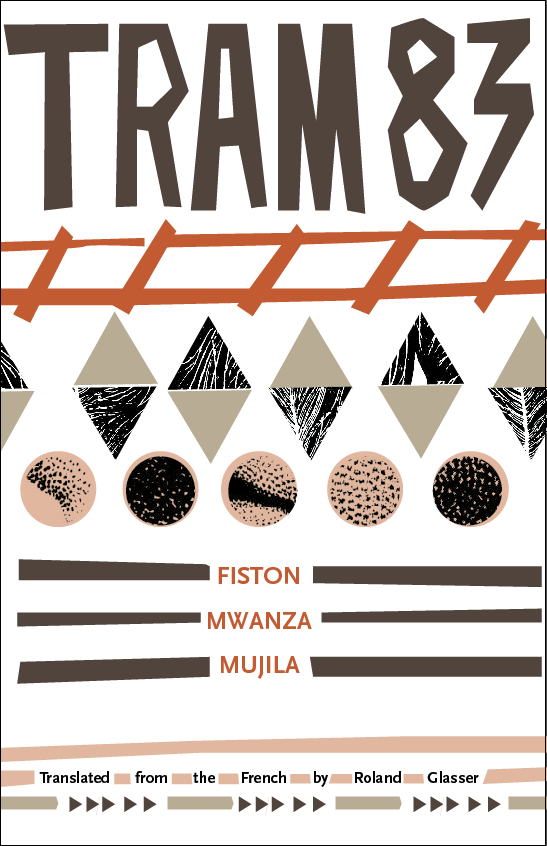Speciale
Fiston Mwanza Mujila, Tram 83
In an African country called City-Country, every night Tram 83 gathers a heterogeneous mass of people thirsty for alcohol, pleasures and oblivion: minors, tourists “for profit”, students on strike, organ sellers, child soldiers, and a multitude of women of all ages: child prostitutes, single mothers, waitresses, assistant waitresses, all named Bessie Smith, Marilyn Monroe and Simone de Beauvoir. In their endless nights, passengers of Tram 83 drink plenty of beer, dance to the rhythm of African rumba, eat kebab, go off into unisex toilets, rob and are robbed, catch a number of diseases, and pour all their hopes, vices, desires, dreams, hatred, and frustrations into the brothel bar. Among the regulars are adventurer Requiem and intellectual Lucien. The two, childhood friends who became reacquainted years later, couldn’t be more different: Lucien, a would-be writer with a degree in history, is a bearded intellectual dressed in black, firmly convinced that literature will save the world; Requiem, known in the city as the Negus, along with a long list of other names, is a man used to everything and with quite shady businesses, who comes back home late at night with sacks full of money, and is instead convinced that only decay will save the world.
Born in 1981 in Lubumbashi (ex-Elisabethville), a mining city in the Democratic Republic of Congo (ex-Zaire), dramatist and poet Fiston Mwanza Mujila always wanted to become a musician. But, in the absence of a sax, he started writing; his writing style is wild, resonating with the cacophony of African metropolises, alive with rhythm, rumba, jazz and urban noises, rich in long and hilarious lists, refrains, biblical quotes, and puns. His debut novel thrills with irresistible energy, the energy of millions of young Africans whose hopes crash daily against the wall of corruption, injustice, and the ferocity of all-powerful puppets such as the Dissident General of the City-Country, “an example like many others… The City-Country was vibrating with literature.”
Fiston Mwanza Mujila will be in Italy to present Tram 83, published in Italy by Nottetempo, at the Festival de la Fiction Française organized by the French and Italian embassies and by the Institut Français. The first encounter will take place during Bookcity 2015, on October 24th at 18,00 at the Institut Français in Milan, in Corso Magenta 63. The introduction will be held by Maria Pace Ottieri. Other encounters are scheduled on October 25th at Feltrinelli bookstore in Parma, on the 26th at Readers' Circle in Turin and on the 28th at the Institute Français in Naples.

Fiston Mwanza Mujila
From Tram 83, by Fiston Mwanza Mujila, translated by Roland Glasser for Pontas Agency
Lucien arrived at 63 Prime Ministry Street around two in the morning.
“Do you have the time? Because I’m smitten. I offer you my breasts. Change me. Make me the most beautiful woman!”
“Drinking beer isn’t drinking. It’s like drinking water.”
“Make love to me hard.”
“Doggy-style, spoon, or missionary? I can even do cowgirl, crab, or octopus, that’s proof I’m acquainted with the facts of life.”
Requiem was waiting for him, accompanied by eight men, all with evocative names: Dragon, Mortal Combat, Free Kick, Dysentery, Invincible Measles, and so on. Rule number 27: you don’t head out to settle your business as if you were going to the beach. “Be imposing,” he stated impatiently. Lucien guessed they were diggers, going by the picks and shovels. After greeting each other, they walked, without a word, down the street to the warehouses that had been burned out and left derelict following the looting of 1992, then restored, then set on fire during the second half of a war of liberation, then taken over by the dissident rebels, who stayed there with their families and the hundreds of domestic animals they kept.
The main entrance gave some idea of the nature of the place. Goats. Roosters. Turkeys. Doughnut stalls. Wheelbarrows. Vehicles from another era. Chairs without legs. Single-mama-pre-baby-chicks who laugh right in your face and heap abuse at you even if you don’t react: “You’re all impotent good-for-nothings, scaredy-cats, peasants, pussies, barely men at all. Come here and let’s see if you can make us moan!” Single-mamas cooked here and there. They crossed the yard filled with children running in all directions.
Lucien wanted to know a bit more about the mission but,
“Gotta see Pig Across Paris. He dominates the film like you’ve no idea.”
Requiem suddenly began a conversation about Jean Gabin. Hehad his own peculiar way of dodging awkward questions through cinema and his weakness for gypsy music. Three in the morning… They entered the third warehouse on the left, a kind of utter mess revised and tropicalized.
Great minds think alike. A well-built man, in camouflage fatigues, standing and cleaning a submachine gun, welcomed them with open arms. Requiem hurried through the introductions. 3:10 a.m . They took their places directly on the jerrycans. The man called out to a young lady, who brought bottles and a succession
of joints. Requiem summed up the situation: “Impossible to enter the Polygon lately without being armed. This past month we got shot at by Death-Death’s gang. They opened fire on three of my men while we were taking the merchandise for washing, and vamoosed with it. Last week the desperados and the mine police laid into us.”
“What do you need?”
He continued swabbing the gun without even looking at his visitors. The Negus took out a scrap of paper and slipped it into his hand.

Tram 83, nottetempo and Deep Vellum cover
“Anything that will allow us to fight our way through the rock.”
The soldier got up, returned with Kalashnikovs, bayonets, explosives, and uniforms.
“It’s the same gear as last time, please return it to me within two days.”
They settled up. Requiem took a few notes out of his haversack. 3:50 a.m.
“The deities quarrel over the heavens and us the earth. They can’t prevent us feasting on our own diamonds,” he moaned.
His gun handling was flawless. Which is normal for someone who’d served in Sudan, Angola, Korea, the former Zaire, Israel, and even Rwanda. Like most young students of the time, he had enlisted supposedly to counter the advances of the second wave of the third war of liberation. Many flocked to join the army with
the aim of changing the world, particularly since they enjoyed fantastic pay, as well as training abroad.
Once outside, they divvied up the artillery. Lucien dithered. They made him pull on a uniform.
“We must recover our sacks.”
The dissident General ruled supreme over the City-State. He owned outright twenty artisanal-diamond purchase and export houses and was a shareholder in nearly all the firms run by the tourists. He sold off the mining concessions, or sometimes even gave them as gifts to whomever he liked. In his megalomania, he
closed and opened Hope Mine as he saw fit, even though the whole of the City-State scrounged a living off this mine. At each closure, an indescribable crisis struck the country for the enjoyment
of a minority of tourists authorized to excavate at any time. But adventurers and traders pissed all over the lunatic dissident General’s decree-laws concerning the closure of Hope Mine. At night they infiltrated the facilities, which were guarded by mercenaries, the chief ’s personal militia, and other security outfits.
Clashes ensued, lasting for hours, accompanied by corpses. The desperados colluded with the mercenaries, supplying them with information and straight-out attacking the diggers, from whom they confiscated the merchandise. The heavily armed diggers, dubbed suicidals for their determination, didn’t let themselves be
intimidated in any way. They handled their Kalashnikovs wonderfully. Whether diggers or dissident rebels or for-profit tourists or students, the common denominator was the gold rush that began at the station whose metal structure …
Lucien, Requiem, and his friends climbed into a jalopy, destination: Hope Mine. Requiem, who was snorting cocaine after cocaine, soliloquized: “Objective 1: we recover our sacks. Objective 2: beat the crap out of any imbecile blocking our way. Objective 3: vanish into thin air. Objective 4: night of debauchery at Tram 83.”
Stoned out of their heads on cannabis, Requiem’s crew attempted to outdo each other through the bragging they unfurled, from the single-mamas with sausage-thighs they’d scarfed during burglaries, to the miner-guards slaughtered in cold blood, not forgetting the many cathouses, which they evoked with a nostalgic air.
In his notebook, Lucien wrote: “The mouths are infected with a thousand thoughts of cannibalism modeled on the Second Republic. What will they munch on when the frangipanis yield guava
and the eucalyptuses earthworms?”
English Publishers:
For North America, Deep Vellum
For UK & Ireland, .Jacaranda Books
For ANZ & South East Asia, Scribe
With the support of 







